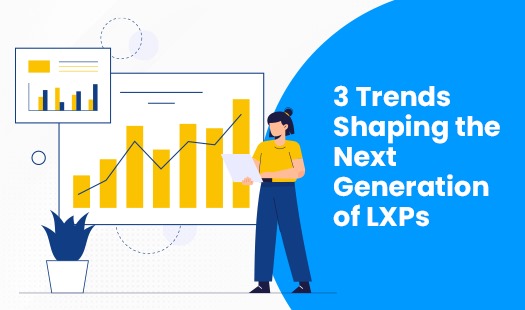
Learning Experience Platforms (LXPs) are changing corporate training by offering personalized, engaging, and relevant experiences. Three major factors drive this transition, establishing new workplace learning and development benchmarks.
1. AI-Powered Personalization
Imagine a learning platform that, like a personal instructor, adapts to your specific talents and shortcomings. This is the power of AI in LXPs. Here’s how it functions in action:
Example: A company harnesses the power of AI in an LXP to enhance a salesperson’s performance. The LXP, through its AI capabilities, identifies areas for improvement, such as objection handling. It then suggests personalized learning paths, including targeted video tutorials, simulations of common sales scenarios using AR, and even peer coaching sessions with top performers. This data-driven approach maximizes skill development and sales performance, ensuring salespeople receive the most relevant training.
Predictive Analytics for Future-Proof Learning: By examining past learner data, LXPs may forecast possible organizational skill gaps. This proactive strategy enables firms to fix these gaps before they become crucial, resulting in a continual learning process and a future-ready workforce.
Example: A healthcare company’s LXP is reactive and proactive. It identifies an increased demand for telemedicine training. It takes the initiative to recommend courses and resources to prepare staff for this growing need. This ensures the organization remains ahead of the curve and ready to meet future challenges.
2. Immersive and Interactive Learning
Forget passive lectures! The next generation of LXPs uses immersive technology to produce engaging and memorable learning experiences:
VR Revolutionizes Training: Imagine the power of practicing a complex surgical technique in a safe virtual environment before entering the operating room. VR simulations inside LXPs provide learners with realistic scenarios, developing a deeper understanding and eliminating on-the-job mistakes. Another example could be a construction worker using an LXP with VR to practice safety procedures on a virtual construction site, engaging them in a hands-on learning experience.
AR Enhances Learning in the Real World: AR adds digital information to actual objects. Imagine a technician using an LXP with AR to diagnose sophisticated machinery. AR acts like a virtual assistant for machinery repair. It superimposes critical information and step-by-step instructions directly over the equipment, making it easier for technicians to diagnose problems.
Gamification: To keep learners hooked, LXPs often employ gamification techniques. Imagine earning points for completing modules, unlocking badges for mastering skills, and even competing with colleagues on leaderboards. This playful approach fosters a sense of accomplishment and friendly competition, driving engagement with the learning material.
Example: A global retail chain uses an LXP with gamified customer service training. Learners compete in simulated customer interactions, earning points for resolving issues effectively. This active approach motivates learners and reinforces critical customer service skills.
3. Social and Collaborative Learning
LXPs promote a collaborative learning environment through social features:
Discussion Forums and Social Feeds: Through discussion boards and social feeds, LXPs establish a learning community that supports and learns from one another, supporting shared development and a common knowledge pool.
Peer Learning and Mentoring: LXPs promote knowledge sharing by bringing together experienced professionals and new recruits through peer mentoring programs. They also provide collaborative projects that encourage collaboration and problem-solving skills. For example, an engineering company may use an LXP with collaborative project capabilities, in which teams collaborate on virtual simulations of construction projects to master design difficulties and communicate efficiently across disciplines.
Learning Experience Platforms (LXPs), which promote customization, immersive experiences, and social collaboration, offer an effective solution. By supporting ongoing growth for individuals and enterprises, LXPs ensure that firms stay competitive and succeed in an ever-changing market.

